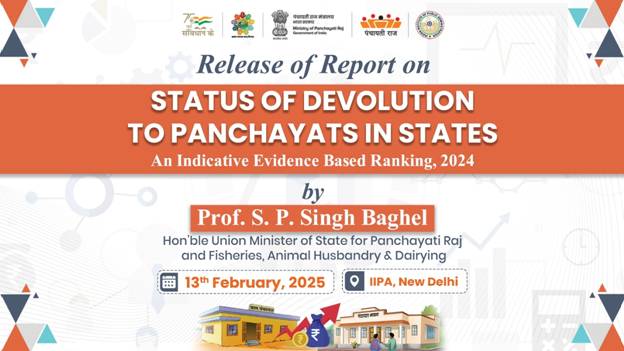Devolution Index Report 2024

- 16 Feb 2025
In News:
Recently, the Union Minister of State Prof. S. P. Singh Baghel released the Devolution Index Report at the Indian Institute of Public Administration (IIPA), New Delhi.
Titled “Status of Devolution to Panchayats in States – An Indicative Evidence-Based Ranking 2024”, the report assesses the extent of autonomy and empowerment of Panchayati Raj Institutions (PRIs) across Indian States and UTs.
Context and Constitutional Framework
The initiative is anchored in the vision of Article 243G of the Constitution and the 73rd Constitutional Amendment, which mandates the devolution of powers, authority, and responsibilities to Panchayats over 29 subjects listed in the Eleventh Schedule. It reflects the spirit of grassroots democracy and aims to realize the vision of "Local Self-Government".
Core Objectives and Dimensions of the Index
The Devolution Index provides an evidence-based evaluation of decentralization and self-governance in rural India. It assesses PRIs across six critical dimensions:
- Framework – Legal and institutional setup for decentralization.
- Functions – Scope of responsibilities devolved to Panchayats.
- Finances – Fiscal powers and resource autonomy.
- Functionaries – Availability and control over human resources.
- Capacity Building – Training and skill development mechanisms.
- Accountability – Transparency, audit mechanisms, and citizen participation.
Significance and Policy Implications
- Strengthening Cooperative Federalism: By highlighting inter-state comparisons, the Index fosters competitive federalism in the spirit of collaborative governance.
- Multi-Stakeholder Utility:
- Citizens: Increases transparency in Panchayat functioning and fund utilization.
- Elected Representatives: Offers a data-driven basis for decentralization advocacy.
- Officials & Policymakers: Acts as a policy instrument for reform and targeted capacity building.
- Aligns with National Vision:
- Supports Viksit Bharat goals through ??????????????????????????????? (developed and empowered PRIs).
- Contributes to inclusive rural development and grassroots democratization.
